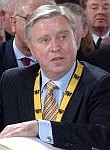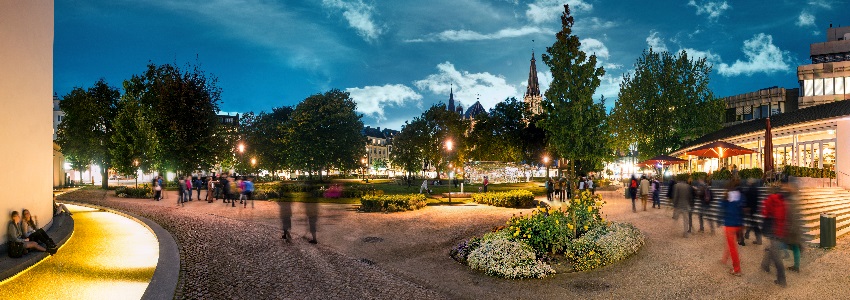Citation of the Board of Directors of the Society for the Conferring of the International Charlemagne Prize of Aachen on the occasion of the award of the 2004 Charlemagne Prize to Pat Cox, President of the European Parliament
 After a hesitant beginning in the 1950s, the European Union has made rapid progress over the last decades: the Coal and Steel Community comprising six countries has become a Union of 15 Member States, and ten further states are about to accede. The Economic Community has become an international trade and economic power with the most prosperous single market in the world. The present Union goes far beyond the borders of the original Customs Union, and now over 300 million people use one and the same currency. However, as European policy becomes increasingly important for the daily lives of citizens, so it becomes more difficult for them to see clearly who is responsible for Community policy - and this in turn often leads to a lack of public acceptance. The Nice Summit and the much-discussed post-Nice process have made clear - if such a reminder was necessary - that European policy must be overhauled.
After a hesitant beginning in the 1950s, the European Union has made rapid progress over the last decades: the Coal and Steel Community comprising six countries has become a Union of 15 Member States, and ten further states are about to accede. The Economic Community has become an international trade and economic power with the most prosperous single market in the world. The present Union goes far beyond the borders of the original Customs Union, and now over 300 million people use one and the same currency. However, as European policy becomes increasingly important for the daily lives of citizens, so it becomes more difficult for them to see clearly who is responsible for Community policy - and this in turn often leads to a lack of public acceptance. The Nice Summit and the much-discussed post-Nice process have made clear - if such a reminder was necessary - that European policy must be overhauled.
The practical implementation of the economic, monetary - and finally also political - union, the accession of new Member States, the reform of the political system within a future European constitution and the renewal of the international role of the EU all point to a new dimension in the process of integration. In this decisive phase in the future development of Europe - the public is only partially and inadequately aware of this - one European institution, which alone among European institutions, has derived its legitimacy for a quarter of a century from direct elections, has now adopted a leading role. This institution is, of course, the European Parliament.
It was the European Parliament that set a timeframe for the conclusion of the first round of enlargement and insisted in particular that the new Member States could take part in the forthcoming parliamentary elections in June 2004.
It was also the European Parliament that adopted a report on the constitutionalisation of the Treaties in October 2000, even before the conclusion of the Treaty of Nice, and demanded a convention on the future of Europe.
If 2003 was the year of preparations for enlargement and a further deepening of the Union, 2004 will be the year of the European Parliament: a Parliament in which Community enlargement must be implemented and imbued with life and on which hopes for further integration now rest; a Parliament that stands for the democratic identity of a united Europe and overcoming selfish national interest; and a Parliament whose Members and representatives from the accession countries already give the Union of 25 - stretching from Portugal to Latvia and from Finland to Cyprus - a human face.
The Board of Directors of the Society for the Conferring of the International Charlemagne Prize of Aachen has therefore decided to award its 2004 prize to Pat Cox, President of the European Parliament, at recognition of the pioneering role played by the European Parliament in a critical phase in the development of Europe and also of his outstanding personal contribution in bringing about the imminent enlargement of the Union.
Patrick (Pat) Cox was born on 28 November 1952 in Dublin where his father worked as a watchmaker. He grew up in Limerick where he attended St Munchins CBS and the Ard Scoil Ris. In 1974 he graduated BA in Economics. After teaching economics at the Institution of Public Administration in Dublin, he graduated MA in 1976 and was given a teaching appointment in 1982 at the university of his home town, Limerick. There he was one of the founders of the first Irish undergraduate programmes for European studies.
Between 1982 and 1986 he became well-known in Ireland as an RTE TV presenter of popular political programmes in Dublin such as 'Today Tonight', before switching to politics and becoming the General Secretary of the Progressive Democrats which he had founded.
Although elected to the European Parliament back in 1989, he continued to be mainly rooted in Irish politics At the beginning of the 1990s he was still financial affairs spokesman of the Progressive Democrats in Dail Eireann. After leaving his party, Pat Cox was reelected as an independent candidate in the 1994 European Parliament elections. The Liberal Group, which he had joined in 1989, then elected him vice-chairman - a position which enabled him to wield a decisive influence on Liberal strategy and politics. He was appointed chairman by his group in 1998, one year before the European Parliament elections. When the Santer Commission became discredited owing to the conduct of two of its Members, the European Parliament - and in particular the Liberal Group - played an unusually dynamic role. Above all, Pat Cox, speaking on behalf of the Liberals, repeatedly stressed the individual responsibility of Commission Members towards the European Parliament. The exceptionally acerbic debate inside and outside Parliament led finally in March 1999 - for the first time in the history of the EU - to the resignation of the entire Commission.
In the June 1999 elections Pat Cox, standing again as an independent candidate, successfully defended his seat in Parliament. The Liberal and Democratic Group, whose 51 members made it the third largest group, then confirmed him in his office as chairman. On 15 January 2002 this married father of six children was elected President of the European Parliament. He set the following clear priorities for his term of office:
The enlargement of the European Union.
Strengthening the role of the European Parliament and enhanced and more mature cooperation with the other institutions in order to establish a legislative procedure which is more transparent for European citizens. The democratic element - represented by the European Parliament - should exert a decisive influence on bureaucratic procedures
Ensuring that the European Parliament makes a substantial contribution to the Convention.
In the first few months of his Presidency Pat Cox made an unprecedented move, clearly showing that the European Parliament sees itself as the driving force behind enlargement. He invited 147 Members from the national parliaments of the ten accession countries and also guests from Bulgaria and Romania to a plenary debate on enlargement in November 2002 and gave a memorable account of how MEPs see their role:
'As parliamentarians we are challenged to give leadership, to win (...) public consent in the Member States and the Accession States alike. There is no public relations or information campaign substitute for real politics based on conviction and reason. Now is the time for politicians to repossess the enlargement agenda from the experts who have prepared the way (...).
We parliamentarians are the ones with direct contact to our constituents. We know the aspirations and anxieties of our peoples. We must take possession of the enlargement agenda and communicate it to our citizens. We must bring vision and give leadership. We are the indispensable democratic link between our constituents, our regions, our countries and the European idea.'
In order to prepare for the imminent process of enlargement, Pat Cox, has acted on his words and visited all the immediate candidate countries in the first few months of his Presidency. These visits were intended above all to assure the political leadership as well as the population in the accession countries of the full support of the European Parliament at this difficult phase in preparing their referenda and they were also aimed at some Western sceptics.
By organising a vigorous campaign for an Irish 'yes' vote to the Treaty of Nice, the President of the European Parliament used the influence conferred on him by his office to persuade his fellow countrymen. Alone among Irish politicians, he rented an election bus for several weeks and travelled the length and breadth of Ireland to talk directly to citizens in front of supermarkets, in pubs and on the streets. Once the Irish people had opened the way to enlargement by voting by an overwhelming majority in favour in the second referendum in October 2002, the President said not without pride: 'The only people in the EU to have been consulted have, after a period of reflection, given the clearest possible signal that Europe's rendezvous with history cannot be further delayed or postponed'.
In its day-today business the European Parliament under Pat Cox subsequently demonstrated the political will to involve the accession countries as rapidly and comprehensively as possible in EU policies. Observers from the national parliaments of the ten future Member States have thus been involved in the work of the European Parliament, its plenary and its committees since the signing of the Treaties of Accession in April 2003.
This liberal Irishman is possessor of three key qualities: transparency, a popular touch and a pragmatic approach to politics. He demands that the other institutions and organs of the Union should demonstrate the same qualities. On the presentation to the Thessaloniki European Council of the draft constitution of the Convention, he made the following ringing declaration:
'Having the Treaty agreed well before the next European elections is important. Our citizens have the right to know what they are voting for, what role this Parliament is destined to have in the wider Europe. I also hope that the new Treaty can contribute to making the next elections to the European Parliament the first real European elections.
Whatever the final outcome of the Treaty itself, enthusiasm for the European project will only be rekindled if Europe addresses the concerns of our citizens, and if Europe delivers. Our electors are blithely indifferent to questions of qualified majority voting and subsidiarity; they want action on jobs, on security and on peace. They are less interested in how we organise the input, more concerned with our output capacity.'
President Cox outlined his views even more trenchantly in a recent interview with the Frankfurter Allgemeine Zeitung. Remarking that voters were tired of voting on Treaty amendments over and over again, he demanded in very clear terms that practical political projects should occupy the centreground of European politics in the next few years: 'We should impose a moratorium on endless navel-gazing in the EU and address tasks such as job creation and the economy' (Frankfurter Allgemeine Zeitung of 10 November 2003).
If ten new Member States are poised to accede to the Community in 2004, this is due in very considerable measure to the European Parliament whose task it now is to give shape to the enlargement and the deepening of the Union, to imbue this process with life and bring it even closer to the citizens of Europe. In awarding the 2004 Charlemagne Prize to Pat Cox, the Board of Directors of the Society for the Conferring of the International Charlemagne Prize of Aachen is honouring the foremost representative of that institution which, through the legitimacy derived from being the only directly-elected EU institution, represents the democratic element in the Union, which has decisively added to the quality and dynamism of the process of enlargement and upon which hopes for a further deepening of the process of unification now rest.
Curriculum Vitae
More Information in German
Website of The European Parliament




